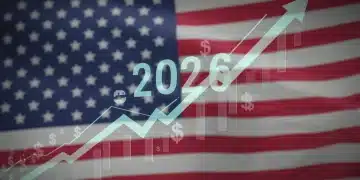Tax presidential debate coverage: what you need to know

Tax presidential debate coverage is crucial as it reveals candidates’ positions on tax policies, significantly impacting voter decisions and shaping public perceptions during elections.
Tax presidential debate coverage has become crucial in understanding the economic narratives shaping elections. It’s essential to know how each candidate’s approach to taxation affects not just policies, but our everyday lives. Ready to dive in?
Overview of the latest tax proposals
Understanding the latest tax proposals is essential for voters. These proposals can significantly influence the economy and personal finances. Each candidate has unique plans that can shape the future.
Key Features of Current Tax Proposals
Tax proposals usually include adjustments to rates, deductions, and credits. Below are some major features to consider:
- Changes in income tax rates
- Increased standard deductions
- New tax credits for families
- Adjustments for business taxes
Additionally, it is important to examine how each candidate’s tax plan aligns with their overall economic strategy. Candidates argue that their tax proposals will stimulate growth and benefit middle-class families. However, the long-term impacts can vary, and it’s crucial for voters to understand these differences.
Impact on the Economy
Each proposal aims to tackle different economic challenges. For instance, some might focus on reducing the deficit by closing loopholes, while others may prioritize economic stimulus through tax breaks.
As you follow the debates, pay attention to how these proposals are received by economic experts. Their insights can help clarify the potential impacts.
- Evaluate the fairness of tax burdens
- Assess the influence on small businesses
- Consider the implications for social services
The ongoing discussion surrounding the latest tax proposals highlights the significance of tax policy in shaping governmental priorities. Voter awareness is key to understanding which policies may come to fruition after elections.
Key candidates’ positions on taxation
The key candidates’ positions on taxation are crucial as they outline how different political leaders plan to manage the economy. Understanding these positions helps voters make informed decisions.
Candidate A: Focus on Tax Cuts
Candidate A proposes significant tax cuts aimed at individuals and businesses. Their strategy is to stimulate economic growth by keeping more money in the hands of taxpayers. Supporters argue that this approach will drive job creation and increase consumer spending.
- Reduction in income tax rates for middle-class families
- Lower corporate tax rates to attract businesses
- Elimination of certain deductions to simplify the tax code
Candidate B: Progressive Taxation
In contrast, Candidate B advocates for a more progressive tax system. This candidate believes that wealthier individuals should pay a larger share of taxes to support social programs. They argue this will reduce income inequality and provide essential services for all citizens.
- Higher tax rates for incomes above a certain threshold
- Increased funding for healthcare and education
- Reform of capital gains taxes to ensure equity
Additionally, Candidate C focuses on reforming tax loopholes. They believe that closing these loopholes will ensure that wealthy individuals and corporations pay their fair share. This strategy is presented as a way to fund important initiatives without raising taxes for the average citizen.
As these candidates present their plans, it’s important for voters to consider how each approach aligns with their own values and financial situations. Evaluating these positions will help clarify the impact of each candidate’s tax policies on households and businesses alike.
Impact of tax policies on voters

The impact of tax policies on voters is significant and cannot be overlooked during elections. Tax decisions made by candidates can directly affect people’s finances and economic well-being.
Understanding Voter Concerns
Many voters are concerned about how tax policies will influence their personal budgets. For instance, changes in income tax rates can have immediate effects on take-home pay. Voters often want to know if they will keep more money in their pockets or face increased costs.
- How will tax cuts benefit working-class families?
- What deductions will change for homeowners and small businesses?
- Will taxes on investments impact future savings?
Perceptions of Fairness
The perception of fairness in tax policies also plays a crucial role in shaping voter opinions. When candidates propose taxing the wealthy at higher rates, many voters view this as a step towards equity. However, some fear this approach may hurt job creation and economic growth.
Voters closely watch how candidates address issues of tax fairness. Many believe that a fair tax system helps everyone. As candidates discuss their policies, the emphasis on fairness can persuade voters to support or oppose them.
- Do tax policies support public services like education and healthcare?
- How will proposed taxes impact local economies?
- Are loopholes being closed to ensure everyone pays their share?
Ultimately, the impact of tax policies on voters is complex and deeply personal. Individuals must feel that their voices matter in tax discussions to engage meaningfully in the democratic process. This awareness influences voting behavior and shapes the election outcomes.
Analysis of past debates on taxes
The analysis of past debates on taxes offers valuable insights into how candidates have handled tax issues in previous elections. Evaluating these debates helps voters understand candidates’ strategies and priorities.
Key Moments in Tax Debates
Several moments stand out in past tax debates. Candidates have often clashed over proposed tax cuts versus tax increases. These discussions have not only reflected their economic philosophies but have also highlighted their approach to fairness and equity.
- Memorable exchanges on tax policy effectiveness
- Impact of specific tax proposals on critical voter demographics
- Reactions to new data presented during debates
Voter Reactions and Outcomes
During these debates, voter reactions can change based on how candidates articulate their tax policies. For example, clear explanations of how tax cuts will benefit everyday Americans can resonate strongly with voters. Similarly, candidates who effectively outline their plans for closing loopholes often gain support.
Debate performances can shift public opinion. Candidates who struggle to communicate their ideas may lose ground in the polls. Observers note patterns in how tax discussion sways potential voters.
- Which arguments led to shifts in support
- Voter demographics most influenced by tax discussions
- Trends in tax policy support over the years
By understanding the analysis of past debates on taxes, individuals can better appreciate the ongoing conversation about tax policy today. It shows the evolution of candidates’ strategies and how past performances shape current expectations.
How to interpret tax debate outcomes
Understanding how to interpret tax debate outcomes is vital for voters as they assess candidates’ positions. The way candidates frame their tax proposals can influence public perception and voter behavior.
Evaluate Candidates’ Responses
During tax debates, it’s important to pay attention to how candidates respond to questions about their proposals. Look for clarity in their answers and whether they provide evidence to support their claims. Candidates who can clearly articulate the benefits and potential drawbacks of their tax plans often resonate more with voters.
- Analyze the facts provided by candidates
- Consider how well they handle challenging questions
- Assess their ability to connect proposals to real-life impacts
Impact on Voter Confidence
The information presented in debates shapes voter confidence. If candidates appear knowledgeable and confident in their tax policies, voters are more likely to trust them. Conversely, uncertainty or vague responses can lead to skepticism about their proposals.
Voter perceptions are often based on how much candidates seem to understand their own policies. This understanding can directly impact the effectiveness of their campaign messaging.
- Identify strong points made by candidates
- Gauge audience reactions during presentations
- Observe how discussions about tax plans evolve
Listening to experts analyze the aftermath of debates can also provide insights. Analysts often break down how various speeches and arguments may sway public opinion. This analysis can clarify the effectiveness of each candidate’s message.
Overall, grasping how to interpret tax debate outcomes enables voters to navigate the complexities of political discourse. It equips them with the knowledge to make informed choices as they head to the polls.
FAQ – Frequently Asked Questions about Tax Presidential Debate Coverage
How do tax debates impact voter decisions?
Tax debates highlight candidates’ positions, helping voters understand how policies may affect their finances and overall economic well-being.
What are key elements to look for in tax proposals?
Focus on tax rates, deductions, and credits, as well as how proposed changes will benefit families and businesses.
Why is it important to analyze past tax debates?
Analyzing past debates reveals patterns in candidates’ strategies and helps voters recognize effective arguments related to tax policies.
How can I stay informed about tax policies during elections?
Follow reputable news sources, watch candidate debates, and participate in community discussions to stay updated on tax policy developments.





